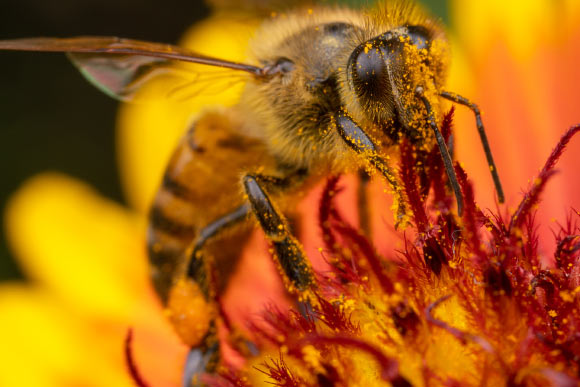A new study published in the Proceedings of the National Academy of Sciences shows that honeybees exposed to glyphosate — the primary herbicide used globally for weed control — lose some of the beneficial gut bacteria and are more susceptible to infection by opportunistic pathogens.
“We need better guidelines for glyphosate use, especially regarding bee exposure, because right now the guidelines assume bees are not harmed by the herbicide. Our study shows that’s not true,” said Erick Motta, a graduate student in the Department of Integrative Biology at the University of Texas at Austin.
Because glyphosate interferes with an important enzyme found in plants and microorganisms, but not in animals, it has long been assumed to be nontoxic to animals, including humans and bees.
But the new study shows that by altering a bee’s gut microbiome, glyphosate compromises its ability to fight infection.
Motta and co-authors exposed honeybees to glyphosate at levels known to occur in crop fields, yards and roadsides.
They painted the bees’ backs with colored dots so they could be tracked and later recaptured.
Three days later, they observed that the herbicide significantly reduced healthy gut microbiota.
Of eight dominant species of healthy bacteria in the exposed bees, four were found to be less abundant.
The hardest hit bacterium, called Snodgrassella alvi, is a critical species that helps bees process food and defend against pathogens.
The bees with impaired gut microbiomes also were far more likely to die when later exposed to an opportunistic pathogen, Serratia marcescens, compared with bees with healthy guts.
About half of bees with a healthy microbiome were still alive eight days after exposure to the pathogen, while only about a tenth of bees whose microbiomes had been altered by exposure to the herbicide were still alive.
“Studies in humans, bees and other animals have shown that the gut microbiome is a stable community that resists infection by opportunistic invaders,” said Professor Nancy Moran, also from the Department of Integrative Biology at the University of Texas at Austin.
“So if you disrupt the normal, stable community, you are more susceptible to this invasion of pathogens.”
Based on their results, the scientists recommend that farmers, landscapers and homeowners avoid spraying glyphosate-based herbicides on flowering plants that bees are likely to visit.
More than a decade ago, U.S. beekeepers began finding their hives decimated by what became known as colony collapse disorder. Millions of bees mysteriously disappeared, leaving farms with fewer pollinators for crops. Explanations for the phenomenon have included exposure to pesticides or antibiotics, habitat loss and bacterial infections. This new study adds herbicides as a possible contributing factor.
“It’s not the only thing causing all these bee deaths, but it is definitely something people should worry about because glyphosate is used everywhere,” Motta said.
“Native bumblebees have microbiomes similar to honeybees, it’s likely that they would be affected by glyphosate in a similar way,” Professor Moran added.
_____
Erick V.S. Motta et al. Glyphosate perturbs the gut microbiota of honey bees. PNAS, published online September 24, 2018; doi: 10.1073/pnas.1803880115








